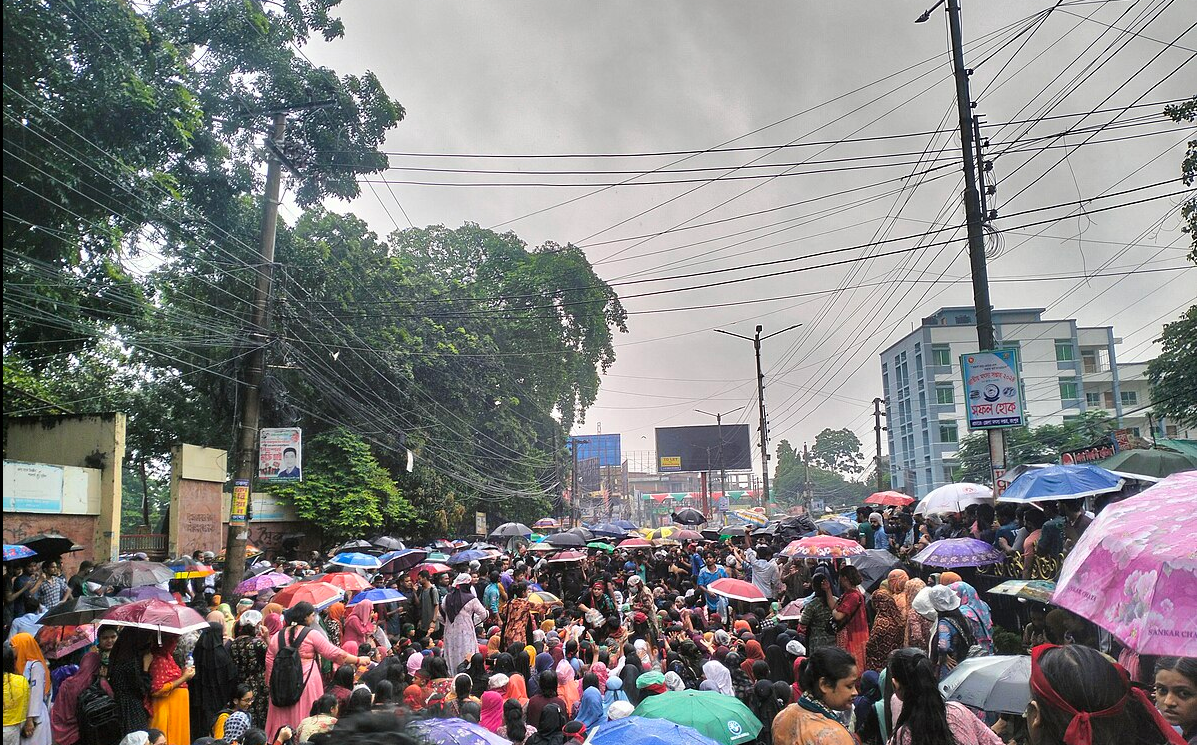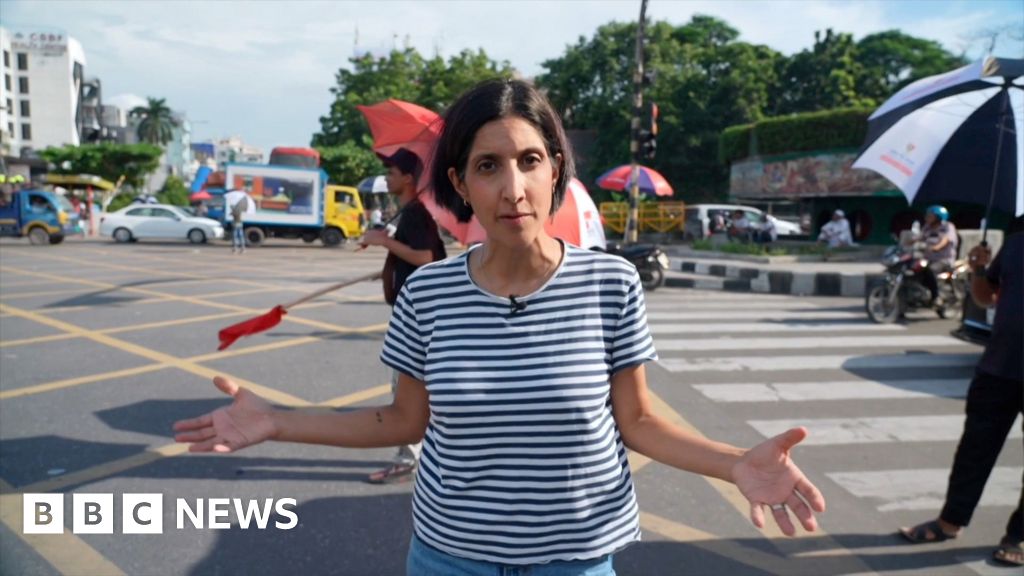Bangladesh Prime Minister flees: "She was killing garment workers"
Uprising in Bangladesh - what now for garment workers?

On the 5th of August a helicopter took off from Dhaka, the capital of Bangladesh, and flew at great speed towards the border of India. The helicopter carried former Bangladeshi Prime Minister Sheikh Hasina who resigned in the face of a huge wave of protests. She left having presided over the massacre of at least 300 protesters, many of them young students.
From student movement to national protest movement
Bangladesh has been experiencing economic crisis since the pandemic. A controversial decision to reinstate a quota for public sector jobs – seen as ruling party nepotism in disguise – sparked anger amongst students who face a bleak economic future.
Protest spread, growing beyond a single issue to encapsulate wider discontent at the economic malaise and dictatorial repression that characterised Sheikh Hasina’s rule. Hasina responded by authorising lethal violence, curfews, and internet black outs.
Whilst not originally an uprising about the garment sector, the student movement has had a profound impact on an industry that employs millions of people and is expected to account for 90% of Bangladesh's $55 billion annual exports in 2024.
The latest Asia Floor Wage Alliance briefing from Bangladesh describes how ‘the protests resonated with some younger garment workers, who either participated in the protests or were sympathetic to the students' demands.’
There are no clear figures on how many garment workers joined the protests over the past months, nor yet a precise figure for how many have been killed. Current internal reports of fatalities amongst garment workers range from 6-11, with a 20-year-old garment worker being killed on the 5th August shortly before the former Prime Minister resigned.
It was not the first time garment workers in Bangladesh have faced down armed police authorised by Hasina to use lethal force. In late 2023, when minimum wage protests erupted across Bangladesh, four garment workers were killed. In the aftermath of these protests, workers and trade union organisers were targeted for arrest, with at least 115 people jailed.
"[Sheikh Hasina] was killing garment workers last year when they raised their voice for a living wage,” says Nazma Akter, President of Sommilito Garment Sramik Federation. “Most of the ruling party leaders and business people were not worker friendly. For the last fifteen years she was like a dictator. She was not caring about the people, their livelihoods, or the workers."
Garment workers had been asking for a minimum wage of 23,000 taka (£165), but Hasina’s government granted them just 12,500 taka (£90) per month. In this context, student calls for economic justice and social change were met with recognition and approval. As the protests spread they disrupted garment supply chains while highlighting anger at worker mistreatment.
“Workers participated in the organising, their children did, as students who saw their future as bleak,” says Chaumtoli Huq, founder of Law@theMargins. “For the Long March student leaders specifically invited and asked to mobilize garment workers. If Hasina hadn't resigned we would have seen a broad based movement.”

Following the protests, the police have fled
Uncertain future
Bangladesh now faces an uncertain future, with Nobel laureate Muhammad Yunus heading an interim government formed by the Army, and calls for elections to be held soon. Contrary to his international reputation in microfinance, unions in Bangladesh are privately describing Yunus as ‘anti-worker and anti-union’.
In America, Scott Nova, Executive Director of the Worker Rights Consortium, sees a difficult road ahead: “Garment workers fighting for decent wages and conditions were long a primary target of Hasina's brutality. A central test of whatever government is to follow will be whether it transcends that anti-worker legacy or perpetuates it.”
“The structures of the garment industry remain the same,” also warns Chaumtoli Huq. “Unless specific efforts are made to ensure garment workers and all workers are heard, we may see their issues ignored or sidelined.”
There is, however, an opportunity here for widespread change. The AFWA briefing states: ‘The student movement underscored issues of justice and rights, which could inspire garment workers to demand better conditions in the long term. The visibility of these issues might lead to increased activism among workers, particularly in seeking improvements in wages, safety, and working conditions.’
For decades, many of Bangladesh’s garment factories have been owned and ruled by individuals and families closely associated with the Awami League – Hasina’s ruling political party. For example, Mohammad Sohel Rana, owner of Rana Plaza, gathered much of his thuggish power from his close association with the Awami League.
But now the Awami League finds itself hugely unpopular – opening up a crack in the establishment and a chance to reject the diktats of factory owners on both a local and national level. The tyrannical factory owners association, the Bangladesh Garment Manufacturers and Exporters Association (BGMEA) has been described as being in ‘freefall’ due to its association with Hasina and the Awami League.
With corruption and violence laid bare, arguments for the kind of revolutionary change that sees power – and factories – transferred from one social class to another, become far more understandable and attractive.
“We need freedom of expression, freedom of association, freedom of movement,” Nazma Akter says of the challenges ahead. “We need peace and living wages, job security, dignity and an end to gender based violence."
Brands
Critical to what happens next for garment workers is the actions of the global brands who source their products from Bangladesh’s thousands of factories.
A statement from the Rana Plaza Solidarity Collective, a broad-based coalition in the UK (of which I am a part), states that delays and factory closures prompted by the protests ‘are already being used by brands to justify abandoning workers, by cutting orders, shifting production elsewhere and lowering supplier prices.’
Wages for garment workers were due to be paid yesterday, 7th August, but reports from unions in Bangladesh say workers have not yet been paid. Brands abandoned workers during COVID and again during the minimum wage protests last year: ‘This must not happen again. Fashion brands have a duty to ensure worker wages are paid on time and in full, including this week, and that workers do not pay the cost for order stoppages.’
Notes From The Profit Margins
These are a few things I am keeping my eye on in the industry right now.
- Report on the assassination of Guatemalan garment worker leader, Anastacio Tzib Caal. Guatemala remains one of the most dangerous places on the planet to be a trade unionist.
- Olympic uniform investigation into a Jordanian manufacturer accused of exploitation and worker suicides
- Urgent statement on serious mistreatment and union suppression at Chelsea Mills LLP in India
- Nike slashes and burns its sustainability team
- Excellent profile of a young Dalit trade unionist in India
- Because I am always interested in urban mining - here's an article on gold in e-waste
- Love this '1969' report on Paco Rabanne and the space race
- Also... prom dresses made of duct tape!
This newsletter is free - please post it on your socials and forward to a friend or two.
Full solidarity to everyone working to crush fascism in the UK. This despicable rabble of far-right thugs are completely and utterly out-numbered by the millions of people who reject their hate and racist violence. Please consider donating to Stand Up To Racism.
Some resources I have found helpful this week:
- Article on attending anti-fascist protests more safely
- Twitter thread debunking misinformation about migration and crime, housing, benefits etc
- Twitter thread on how to talk to people clearly about what is happening
In solidarity for the month ahead,
Tansy.

